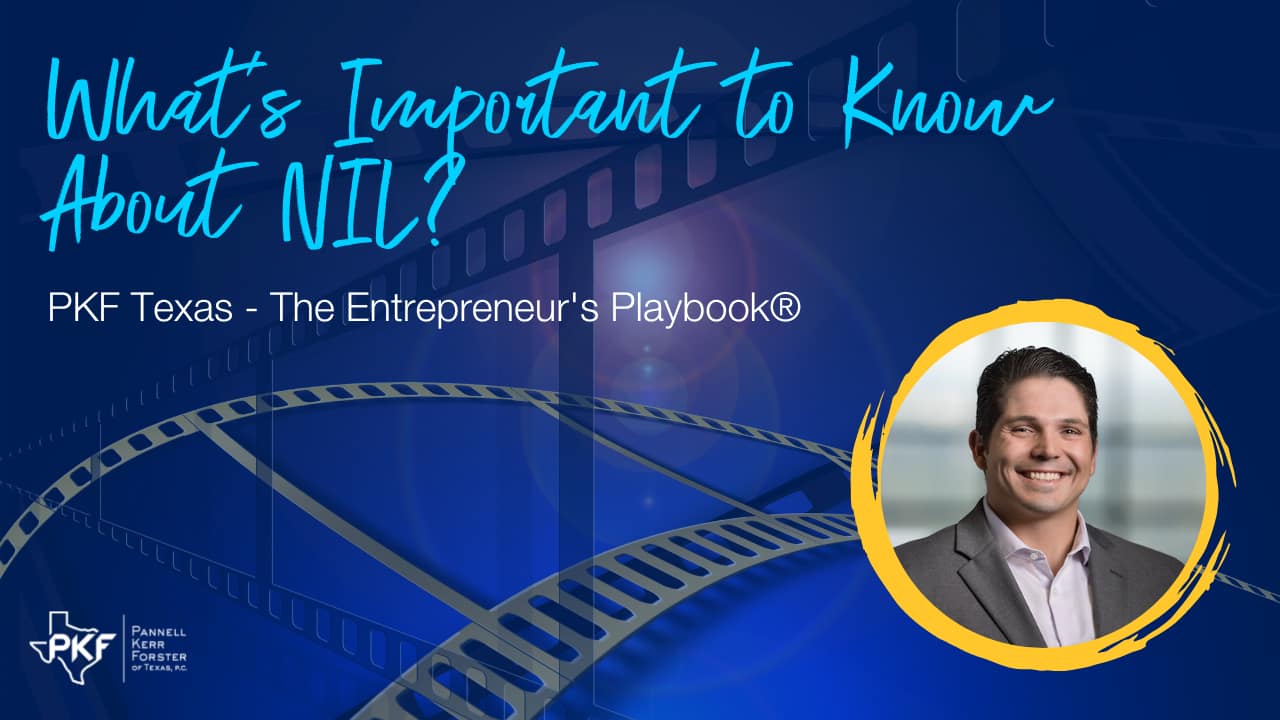What’s Important to Know About NIL?

Name, image and likeness, or NIL as you might know it as. A ruling about this from the Supreme Court impacts students and their bookkeepers or accountants. In this next PKF Texas – The Entrepreneur’s Playbook® episode, Contract Compliance Manager, Carlos Gomez, breaks down important things to know and understand about NIL.
Jen: This is the PKF Texas – Entrepreneur’s Playbook®. I’m Jen Lemanski and I’m back once again with Carlos Gomez, a Contract Compliance Manager here at PKF Texas and one of our Approachable Advisors™. Carlos, welcome back to the Playbook.
Carlos: Thanks, Jen.
Jen: As part of contract compliance, I know you guys deal with all sorts of contracts. One of the hot topics these days is the name, image and likeness information that’s come down from the Supreme Court – or NIL is what I know a lot of people call it. So, what are you seeing in that space and what do either accountants or people need to pay attention to on that?
Carlos: Yeah, so that ruling was actually very decisive and good for students. You know, they’ve been pushing and fighting for that for a long time. And even students that are now playing professional continue to help push that. What it really means — and a lot of accountants or people within the industry need to keep in mind – that that’s specific to the student. So, them as a person, their name, image and likeness or NIL cannot be regulated by NCAA; they’re kind of allowed to do whatever they want in that.
But what they need to do to protect their clients if you’re a bookkeeper or a tax preparer or just a business advisor for those types of students, is that they’ve got to try to disassociate themselves from the school or any other institution, whether that’s high school or college or whatever, that they’re not selling that brand on top of it. And really try to protect themselves from not only trademark infringement of that school but violating any state laws that may be prohibiting that as well.
Jen: So, we’re seeing a lot of movement in this space. And I think you had mentioned to me previously that states have different laws. So, how would a student navigate that? Or how would an accountant navigate that if they’ve got a student whose home state is one state, but they’re playing in another? How does that work?
Carlos: I think you would want to look at it a lot like state and tax laws. You know, some of us can be intermingling whether presence where, like as an athlete, say they come to another state or city to play a game. That income comes subject to the state there. I would look at it the exact same way. But obviously keep your residency, your residence is a bigger concern. I’m sure there’s going to be ways around it, and I’m sure there’s going to be difficult conversations that each government’s going to have to have in order to make those push.
And so, maybe some states will have sanctuary laws where they’re not allowed to extradite on certain things or tax based on other bases. But that’s all going to change. And so, I think it’s really going to be important just to keep all the data. Yeah, right. Try to understand, protect yourself as best as you can to operate within that state and how that school expects you to get the agreements reviewed by the legal team at the school. And just really monitor and keep track. So, if you’ve got to pay taxes or you got to decline a relationship, then you can make those judgements if it comes to it.
Jen: Perfect. Sounds like there’s a lot more to learn and a lot more to talk about.
Carlos: Yes, ma’am.
Jen: Perfect. We’ll get you back.
Carlos: Thank you.
Jen: This has been another thought leadership production brought to you by PKF Texas – The Entrepreneur’s Playbook®. For more information about this and other topics, visit www.pkftexas.com/ContractCompliance. Tune in next week for another chapter.
